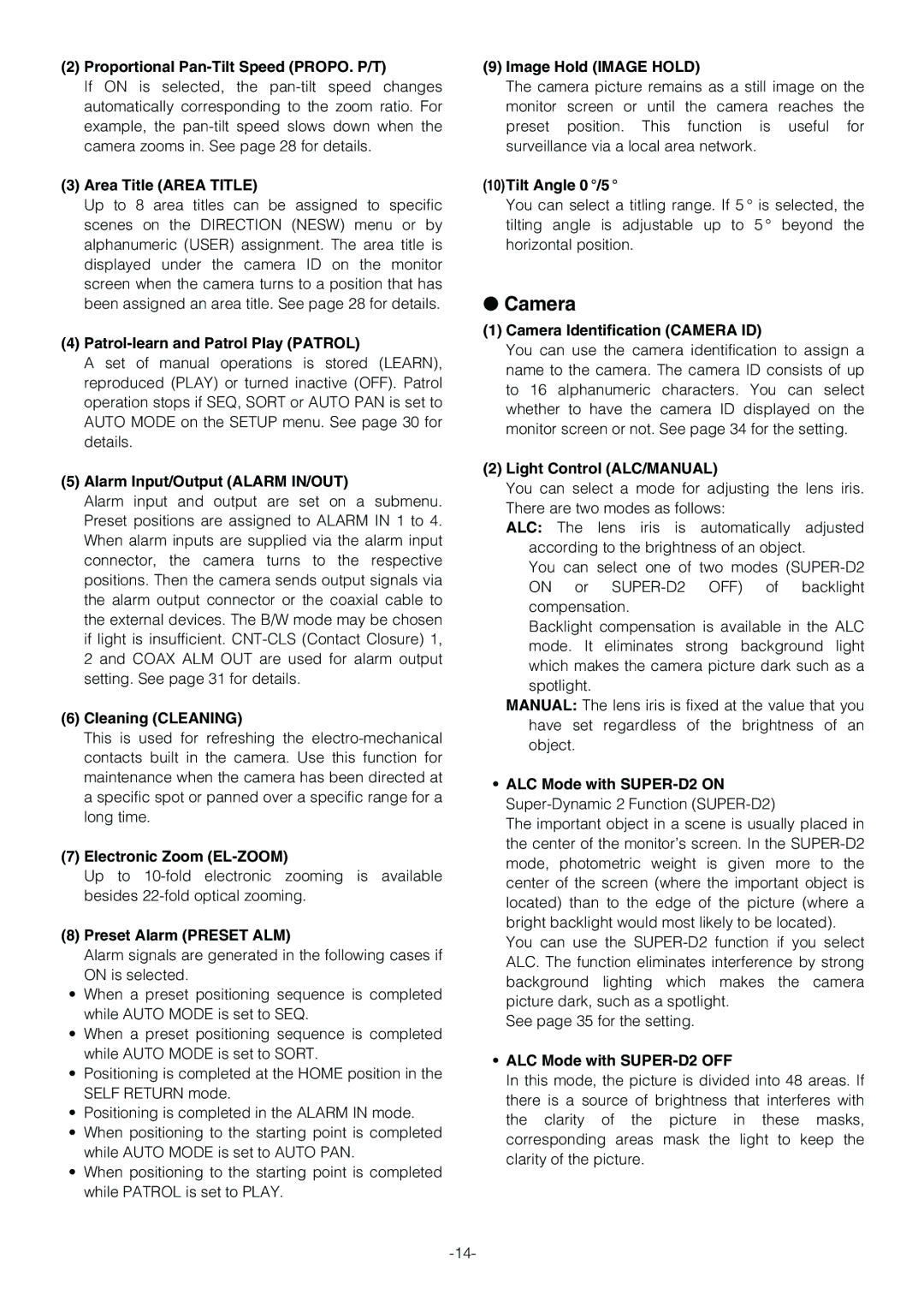(2)Proportional Pan-Tilt Speed (PROPO. P/T)
If ON is selected, the
(3)Area Title (AREA TITLE)
Up to 8 area titles can be assigned to specific scenes on the DIRECTION (NESW) menu or by alphanumeric (USER) assignment. The area title is displayed under the camera ID on the monitor screen when the camera turns to a position that has been assigned an area title. See page 28 for details.
(4)Patrol-learn and Patrol Play (PATROL)
A set of manual operations is stored (LEARN), reproduced (PLAY) or turned inactive (OFF). Patrol operation stops if SEQ, SORT or AUTO PAN is set to AUTO MODE on the SETUP menu. See page 30 for details.
(5)Alarm Input/Output (ALARM IN/OUT)
Alarm input and output are set on a submenu. Preset positions are assigned to ALARM IN 1 to 4. When alarm inputs are supplied via the alarm input connector, the camera turns to the respective positions. Then the camera sends output signals via the alarm output connector or the coaxial cable to the external devices. The B/W mode may be chosen if light is insufficient.
(6)Cleaning (CLEANING)
This is used for refreshing the
(7)Electronic Zoom
Up to
(8)Preset Alarm (PRESET ALM)
Alarm signals are generated in the following cases if ON is selected.
•When a preset positioning sequence is completed while AUTO MODE is set to SEQ.
•When a preset positioning sequence is completed while AUTO MODE is set to SORT.
•Positioning is completed at the HOME position in the SELF RETURN mode.
•Positioning is completed in the ALARM IN mode.
•When positioning to the starting point is completed while AUTO MODE is set to AUTO PAN.
•When positioning to the starting point is completed while PATROL is set to PLAY.
(9)Image Hold (IMAGE HOLD)
The camera picture remains as a still image on the monitor screen or until the camera reaches the preset position. This function is useful for surveillance via a local area network.
(10)Tilt Angle 0 °/5 °
You can select a titling range. If 5 ° is selected, the tilting angle is adjustable up to 5 ° beyond the horizontal position.
●Camera
(1)Camera Identification (CAMERA ID)
You can use the camera identification to assign a name to the camera. The camera ID consists of up to 16 alphanumeric characters. You can select whether to have the camera ID displayed on the monitor screen or not. See page 34 for the setting.
(2)Light Control (ALC/MANUAL)
You can select a mode for adjusting the lens iris. There are two modes as follows:
ALC: The lens iris is automatically adjusted according to the brightness of an object.
You can select one of two modes
Backlight compensation is available in the ALC mode. It eliminates strong background light which makes the camera picture dark such as a spotlight.
MANUAL: The lens iris is fixed at the value that you have set regardless of the brightness of an object.
•ALC Mode with SUPER-D2 ON Super-Dynamic 2 Function (SUPER-D2)
The important object in a scene is usually placed in the center of the monitor’s screen. In the
You can use the
See page 35 for the setting.
•ALC Mode with SUPER-D2 OFF
In this mode, the picture is divided into 48 areas. If there is a source of brightness that interferes with the clarity of the picture in these masks, corresponding areas mask the light to keep the clarity of the picture.
